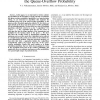Free Online Productivity Tools
i2Speak
i2Symbol
i2OCR
iTex2Img
iWeb2Print
iWeb2Shot
i2Type
iPdf2Split
iPdf2Merge
i2Bopomofo
i2Arabic
i2Style
i2Image
i2PDF
iLatex2Rtf
Sci2ools
107
click to vote
TON
2010
2010
On Wireless Scheduling Algorithms for Minimizing the Queue-Overflow Probability
Abstract-- In this paper, we are interested in wireless scheduling algorithms for the downlink of a single cell that can minimize the queue-overflow probability. Specifically, in a large-deviation setting, we are interested in algorithms that maximize the asymptotic decay-rate of the queue-overflow probability, as the queue-overflow threshold approaches infinity. We first derive an upper bound on the decay-rate of the queue-overflow probability over all scheduling policies. We then focus on a class of scheduling algorithms collectively referred to as the "-algorithms." For a given 1, the -algorithm picks the user for service at each time that has the largest product of the transmission rate multiplied by the backlog raised to the power . We show that when the overflow metric is appropriately modified, the minimum-cost-to-overflow under the -algorithm can be achieved by a simple linear path, and it can be written as the solution of a vector-optimization problem. Using this s...
Related Content
| Added | 22 May 2011 |
| Updated | 22 May 2011 |
| Type | Journal |
| Year | 2010 |
| Where | TON |
| Authors | V. J. Venkataramanan, Xiaojun Lin |
Comments (0)

